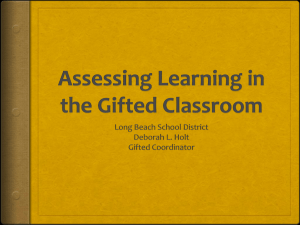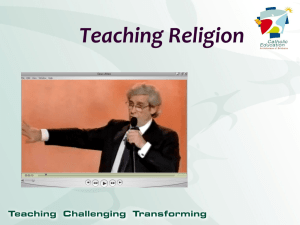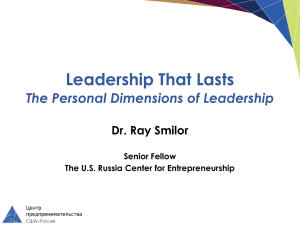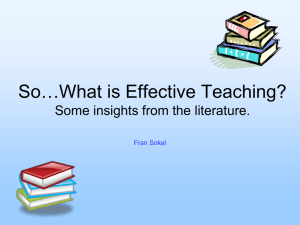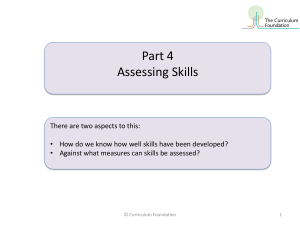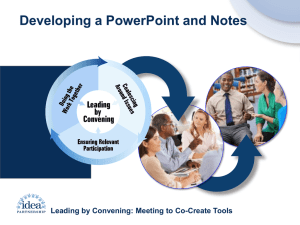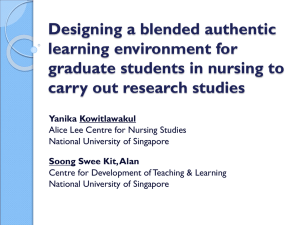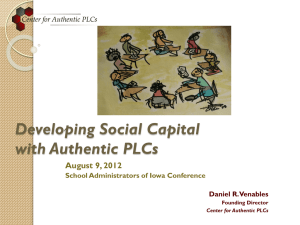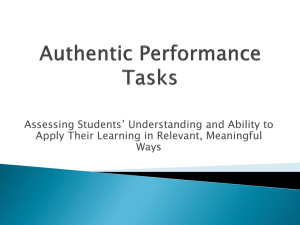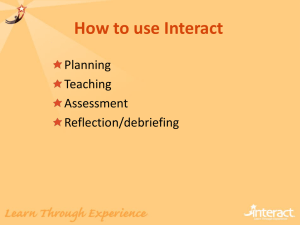The Authentic Self in Educational Leadership
advertisement
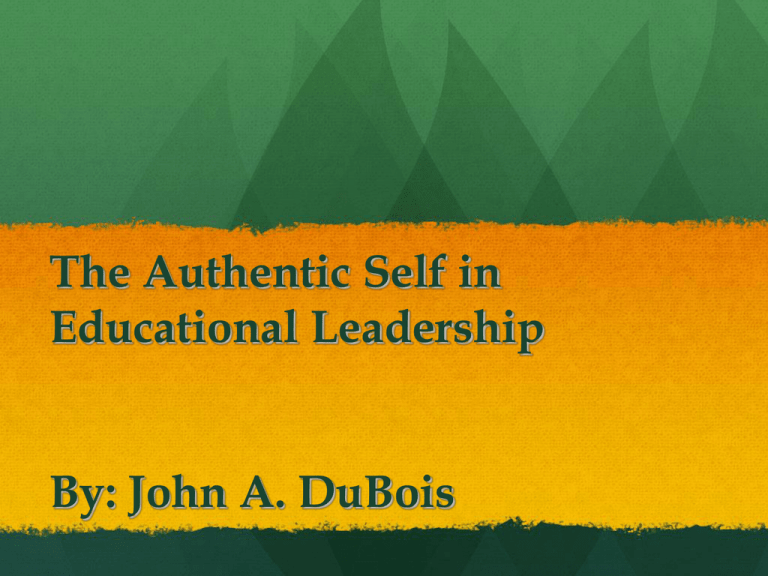
The Authentic Self in Educational Leadership By: John A. DuBois Introduction “good education is always more process than product. …Good education teaches students to become both producers of knowledge and discerning consumers of what other people claim to know” Parker J. Palmer The Courage to Teach. (2007, p. 96) Research Questions “What does it mean to be an authentic educational leader?” “…authentic adult educator?” “…authentic educational leader as teacher?” “…authentic educational leader as principal, superintendent, as parent, as a member of the community, and as an educational expert?” “…authentic adult educator?” Life Stages of an Adult Learner “…inherent desire to experience real-life experiences…” “…authentic adult educator?” Transformative Learning “…assumptions and past experiences are called into question…” “…authentic educational leader as teacher?” Education “…education is the ability to teach and learn skills, knowledge, and develops character based on the systematic method of theoretical application taught by an accredited institution.” “…authentic educational leader as teacher?” Professional Education Programs “…lifelong learning – including competence development – builds on four elements; learning, teaching, education, and development” Kasworm & Hemmingsen, 2007, p. 456 “…authentic educational leader as teacher?” Danish University of Education Curriculum Modules Module 1: Adult learning and adult psychology Module 2: Learning in the workplace or organization Module 3: Competency builders from a sociological and political perspective Module 4: Comprehensive master’s project chosen by student with interest in Adult Learning and Human Resource Development (Kasworm & Hemmingsen, 2007, p. 456) “…authentic educational leader as teacher?” Student Leadership Development Institute Rutgers University, 2001 “Leadership development is a fundamental responsibility of colleges and universities” and “learning opportunities must be created to allow students to apply and practice their knowledge and to experience the consequences of their actions.” Connaughton, Lawrence, & Ruben, 2003, p. 48 “…an authentic educational leader as principal, superintendent, as parent, as a member of the community, or as an educational expert?” Professional Development “… an ongoing process through which an individual derives a cohesive sense of professional identity by integrating the broad-based knowledge, skills, and attitudes with one’s values and interests” (Ducheny, et al., 1997, p. 89) Leadership Diamond Principle Strategy & Tactics Vision: “…sees the larger perspective, for visioning means to think big and new. Reality: “…responds to … facts, for realism means to have no illusions.” Ethics: “…always sensitive to people, for ethics means to be of service.” Courage: “…a courageous leader always claims the power to initiate, act, and risk. … with sustained initiative.” Koestenbaum, P. (2002). Leadership: The Inner Side to Greatness. pp. 41-52. San Francisco: Jossey-Bass Discovering Your Authentic Leadership “Authenticity requires a commitment to developing yourself” (Sims, McLean, & Mayer, 2007, p. 130) Through self-reflection on personal experiences, a leader is able to integrate their lives with others. The balance of internal and external motivations and tensions empowers a leader to make adequate decisions that will inevitably make a positive difference in the lives of others. Principle Research Question “What does it mean to be an authentic educational leader? What does it mean to be an adult learner about becoming an adult educational leader? When do adults learn about becoming an authentic educational leader? How do adults learn about becoming an authentic educational leader? Where do adults learn about becoming an authentic educational leader? Why do adults learn about becoming an authentic educational leader? Subsidiary Research Questions “What does it mean to be an authentic adult educator?” “What does it mean to be an authentic educational leader as teacher? “What does it mean to be an authentic educational leader as principal, superintendent, as parent, as a member of the community, or as an educational expert?” Students Teach Students Leadership Institute Vision: “Empowers students with skills, knowledge, and experience necessary to become educators for tomorrow” Mission: “Students Teach Students Leadership Institute provides students within the academic community to develop and teach newly designed curriculum to their peers within an adult collaborative learning environment.” Students Teach Students Leadership Institute Program Objectives: Establish relationships with fellow educators within their respective fields of study. Learn to teach what we know and how we know what we know through personal story. Reflect upon our own personal experiences as an authentic leader and educator within the classroom and beyond.
